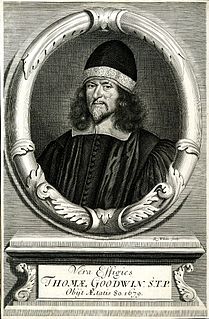A Quote by Charles Spurgeon
This is now a covenant of pure grace; let no man attempt to mix works with it.
Related Quotes
Grace stands in direct opposition to any supposed worthiness on our part. To say it another way: Grace and works are mutually exclusive. As Paul said in Romans 11:6, "And if by grace, then it is no longer by works; if it were, grace would no longer be grace." Our relationship with God is based on either works or grace. There is never a works-plus-grace relationship with Him.
Faith from, its essential nature implies the fallen state of man, while it recognizes the principles of the covenant of grace. It is itself the condition of that covenant. It is a grace which is alike distinguished from the love of angels and the faith of devils. It is peculiar to the returning sinner. None but a lost sinner needs it; none but a humbled sinner relishes it.
In the new covenant, God doesn't want us to be blessed when we obey the law and cursed when we fail. Doesn't such a system sound awfully similar to the old covenant? Grace is the undeserved, unmerited and unearned favor of God - the moment you try to merit the free favors of God, His grace is nullified.
God Most High has said, "Is the reward of virtue aught save virtue?" . . . Know, O man, that the covenant of servanthood is incumbent upon you, and that the covenant of Lordship is incumbent upon His magnanimity, as He Most High has said, ". . . and fulfill your covenant, I shall fulfill My covenant."
With faith in the merciful Redeemer and His power, potential despair turns to hope. One's very heart and desires change, and the once-appealing sin becomes increasingly abhorrent. A resolve to abandon and forsake the sin and to repair, as fully as one possibly can, the damage he or she has caused now forms in that new heart. This resolve soon matures into a covenant of obedience to God. With that covenant in place, the Holy Ghost, the messenger of divine grace, will bring relief and forgiveness.
Many biblical passages teach that we're not saved by our own efforts but by the grace of God alone. But the same passages also tell us good works are an essential evidence of the salvation experience. We're not saved by good works, but for good works. It begins with God's grace, and it's sustained by his grace as you shape your character by what you do as you cross the bridge.
The only man who has the right to say that he is justified by grace alone is the man who has left all to follow Christ. Such a man knows that the call to discipleship is a gift of grace, and that the call is inseparable from the grace. But those who try to use this grace as a dispensation from following Christ are simply deceiving themselves.
We often say, and you have heard the expression as it has already been referred to in this conference, that "as man now is, God once was, and as God now is, man may become." The only way man may become as God now is, is through fulfilling the laws of celestial marriage and the laws of the gospel, as I have just read to you the word of the Lord from the D&C. Can we afford to overlook such opportunities for exaltation? Temple marriage is not just another form of church wedding; it is a divine covenant with the Lord that if we are faithful to the end, we may become as God now is.
Free-will doctrine-what does it? It magnifies man into God. It declares God's purposes a nullity, since they cannot be carried out unless men are willing. It makes God's will a waiting servant to the will of man, and the whole covenant of grace dependent on human action. Denying election on the ground of injustice, it holds God to be a debtor to sinners.


































